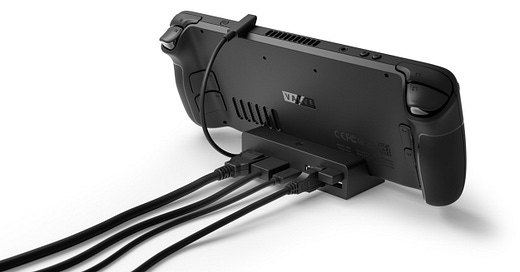Ukraine, Steam Deck, Bandcamp: The Week in Games
It’s been a troubling, and eventful week in the games industry and, well, everywhere. Of course, the war in Ukraine dominates the news as Russia continues its invasion and the world reacts. While the game industry doesn’t have the ability to sanction Russia, seize oligarch yachts or strip evil dictators of their black belts, it still is doing what it can to try and help out.
Amidst all of the world’s turmoil, games like Elden Ring and Lost Ark provided a bit of much-needed distraction to millions, while Valve’s handheld gaming computer Steam Deck delighted dozens (sorry, I’m slightly sad because I haven’t gotten my pre-order yet.)
Meanwhile, Epic Games seemed to surprise everyone by buying artist-first online music store Bandcamp — something that makes a lot of sense once you start thinking about it.
Epic Games Buys Bandcamp
Who
Bandcamp is a U.S.-based music company where artists and labels can upload music and control how they sell it by setting their own prices and allowing users the ability to pay more if they’d like.
Epic Games is one of the ten largest gaming companies in the world, powered both by its seemingly universally-played Fortnite, as well as its Unreal Engine, used by the video game, automobile, film and television, and architecture industries.
What
There are no details yet on specifics of the deal yet, other than Bandcamp CEO and co-founder Ethan Diamond saying the company is joining Epic Games, which he describes as “the champions for a fair and open Internet.”
Why
At first blush, the deal may leave some scratching their heads. Why would a video game developer buy an online music store? But there’s a lot going on here:
Epic Games Store, which is nearing 200 million users, recently started expanding beyond selling and providing just games to download. Spotify, iHeart, and Discord are all on there with a number of other apps.
Bandcamp’s artist-first revenue model (artists net about 82 percent of sales on average) meshes nicely with EGS’ own artists-first approach (Epic’s revenue share grants devs 88 percent of sales).
Video games continue to be a big driver for in-game music. A future where players might be able to grab their favorite video game soundtrack from EGS, or Bandcamp, doesn’t seem that far-fetched.
Sources: Bandcamp, Unreal Engine, Epic Games
Gaming Industry Supports Ukraine
Who
The Russian invasion of Ukraine led to an outpouring of support from just about every country in the world and recriminations and sanctions against Russia. The game industry didn’t stand on the sidelines.
What
There’s far too much going on to touch on it all, but here are some highlights.
In an open letter to all game development companies and esports platforms, the Ministry of Digital Transformation of Ukraine asked that all Belarus and Russian gaming accounts be blocked, that players from those countries not be allowed to participate in esports events, and that no gaming events be held in Belarus or Russia. The Ministry also called on Xbox and PlayStation specifically to ban players.
Electronic Arts is removing all Russian teams from FIFA 22 and NHL 22.
Arma 3 developer Bohemia Interactive is selling a special charity bundle with all proceeds going to humanitarian aid charities. Perhaps more interesting, the bundle includes the war game’s Laws of War DLC which introduces the basics of International Humanitarian Law, also known as the laws of war.
Myriad game developers are donating to Ukraine relief efforts and denouncing Russia’s war on the country. Among those is World of Tanks developer Wargaming (with studios in Ukraine and Russia), which is donating $1 million to the Ukrainian Red Cross.
Why
It’s heartening to see the game industry not shy away from speaking out against this particular unjust war, despite the frequency with which some games glorify war in general.
Sources: Vice Prime Minister of Ukraine and Minister of Digital Transformation of Ukraine, EA Sports NHL, EA Sports FIFA, ARMA 3, World of Tanks, Gamespot
Steam Deck Launches
Who
Valve Corporation, the folks behind Half-Life, Portal, Counter-Strike, and the massive Steam store, has also invested in some interesting hardware experiments over the years including the Steam Controller, the small Steam Machine gaming computer, HTC Vive, and Valve Index VR headsets, and now the portable Steam Deck.
What
After opening up pre-orders for the self-contained AMD-powered handheld gaming computer in July, the first batch of the systems — which run from $400 to $650 — started hitting customers' doorsteps (sometimes in the hands of Valve founder Gabe Newell) this week.
Why
The Steam Deck taps a small but growing market for portable gaming computers most aggressively pursued by Chinese manufacturer Gamepad Digital (GPD). It comes at a time when cloud technology aims to bring big AAA games (PC and console) to everything from a laptop to a smartphone. The purpose-built system (once it works out its bugs) could help to establish a market that has been lingering in the shadows for years.
Sources: Steam Deck, The Verge, GPD, Screenrant, RadioTimes
Etc.
LEGO confirms it’s stopped shipping products to Russia
Thatgamecompany receives $160m investment
Ice Cream Machine Hackers Sue McDonald's for $900 Million
Twitch updates its community guidelines to ban ‘misinformation superspreaders’
Kasparov calls on world powers to throw Russia 'back into the Stone Age'



